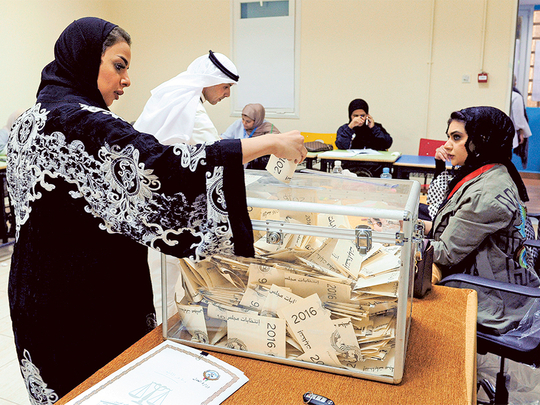
Dubai: Results of the recently held early parliamentary elections in which opposition groups won 24 out of 50 contested seats could seriously impact the fiscal reforms according to economists and analysts.
Most of the newly elected members of parliament including some not affiliated with opposition groups had expressed strong opposition to the government’s fiscal reforms and to subsidy reforms in particular.
“We interpret the results as a clear repudiation of the government’s austerity measures. This is credit negative because it will likely sway the government’s willingness to implement fiscal and economic reforms to reduce the country’s dependence on oil,” said Shirin Mohammadi, Associate Analyst at Moody’s.
Earlier this year, the government unilaterally approved a series of fuel price hikes that took effect in September. But legislators’ strong opposition to the measures led to a surprise dissolution of parliament on October 16.
Compared to its GCC peer’s Kuwait’s progress with fiscal reforms has been limited in many respects. A number of measures, such as increases in fuel prices, were later watered down following the initial announcement due to opposition. During the elections, a number of candidates’ campaigns focused against the unpopular fiscal austerity measures.
“We see the potential for even more limited fiscal reforms going forward, alongside possible pressure on the government to increase public sector wages. As such, beyond 2017, real GDP growth could be increasingly driven by private consumption as was the case pre-2013,” said Monica Malik, Chief Economist of Abu Dhabi Commercial Bank.
Budget deficit
The government has responded to the low oil-price environment by protecting capex and rationalising current spending. Kuwait’s budget deficit reflects the economy’s heavy reliance on oil revenue. The country is expected to post a deficit of up to 11.5 per cent of GDP in current financial year (2016-17 April-March).
The dissolved National Assembly, which was meant to run through July 2017, is widely viewed as considerably more cooperative than the incoming legislature is likely to be, because most opposition candidates had boycotted the last election.
Kuwait has been slower than its peers in GCC (to develop its non-oil and private sectors, and was the last to implement fuel subsidy reforms. Although Kuwait has the lowest fiscal and external break even oil prices in the GCC at $47.80 and $40.10, respectively, in 2016, according to the International Monetary Fund and exceptionally large government financial assets estimated at nearly $600 billion (Dh2.2 trillion), or almost 530 per cent of GDP, in 2015), it is also the GCC country with the highest dependence on oil as measured by exports and government revenues.
Analysts do not expect any major roll back in Kuwait’s investment programme by the new government in both in the hydrocarbon sector and other sectors. Strong project awards in 2015 and in the first nine months of 2016 should still lead to a pickup in real noil GDP in 2017 as projects are implemented. However, analysts see greater risks from 2018, with possible delays in project implementation.
Prior to 2013 when there was a difficult relationship between the cabinet and parliament, project execution was held up due to greater scrutiny by the National Assembly. Moreover, a substantially greater amount of the government’s time was spent on political matters including frequent questioning of ministers and regular elections.











